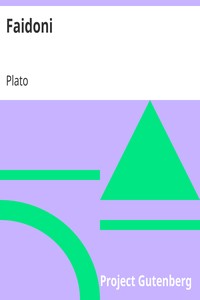Faidoni by Plato
Read now or download (free!)
| Choose how to read this book | Url | Size | ||||
|---|---|---|---|---|---|---|
| Read online (web) | https://www.gutenberg.org/ebooks/19210.html.images | 252 kB | ||||
| EPUB3 (E-readers incl. Send-to-Kindle) | https://www.gutenberg.org/ebooks/19210.epub3.images | 138 kB | ||||
| EPUB (no images, older E-readers) | https://www.gutenberg.org/ebooks/19210.epub.noimages | 139 kB | ||||
| Kindle | https://www.gutenberg.org/ebooks/19210.kf8.images | 241 kB | ||||
| older Kindles | https://www.gutenberg.org/ebooks/19210.kindle.images | 225 kB | ||||
| Plain Text UTF-8 | https://www.gutenberg.org/ebooks/19210.txt.utf-8 | 235 kB | ||||
| Download HTML (zip) | https://www.gutenberg.org/cache/epub/19210/pg19210-h.zip | 134 kB | ||||
| There may be more files related to this item. | ||||||
About this eBook
| Author | Plato, 428? BCE-348? BCE |
|---|---|
| Translator | Calamnius, J. W. (Johan Wiktor), 1838-1891 |
| Uniform Title | Phaedo. Finnish |
| Title |
Faidoni Platonin keskustelma Sokrateen viimeisistä hetkistä ja sielun kuolemattomuudesta |
| Note | Wikipedia page about this book: https://en.wikipedia.org/wiki/Phaedo Wikipedia page about this book: https://sv.wikipedia.org/wiki/Faidon |
| Note | Reading ease score: 42.2 (College-level). Difficult to read. |
| Credits |
Produced by Matti Järvinen, Tuija Lindholm and Distributed Proofreaders Europe. |
| Summary | "Faidoni" by Plato is a philosophical dialogue written in ancient Greece, likely during the late 4th century BC. The text revolves around the final moments of Socrates as he discusses the immortality of the soul with his friends, emphasizing the themes of life, death, and philosophy. The central character is Socrates, who faces his execution with calmness and engages his interlocutors in a deep exploration of philosophical ideas surrounding the soul's nature and fate after death. The opening of "Faidoni" sets the stage for this critical philosophical discourse by presenting a conversation between the character Phaedo and his friend Echecrates about the events leading up to Socrates' death. Through Phaedo's recounting, we learn of Socrates' interactions with his followers in his final hours, where they discuss the reasons for his delayed execution and delve into discussions about the nature of the soul and its relationship to the body. Socrates argues that true philosophers actually desire death as a release from the distractions of the physical body, and he prepares to provide evidential arguments in favor of the soul's immortality, marking the beginning of a profound exploration of life and philosophy. (This is an automatically generated summary.) |
| Language | Finnish |
| LoC Class | B: Philosophy, Psychology, Religion |
| LoC Class | PA: Language and Literatures: Classical Languages and Literature |
| Subject | Immortality (Philosophy) -- Early works to 1800 |
| Category | Text |
| EBook-No. | 19210 |
| Release Date | Sep 8, 2006 |
| Copyright Status | Public domain in the USA. |
| Downloads | 136 downloads in the last 30 days. |
| Project Gutenberg eBooks are always free! | |

